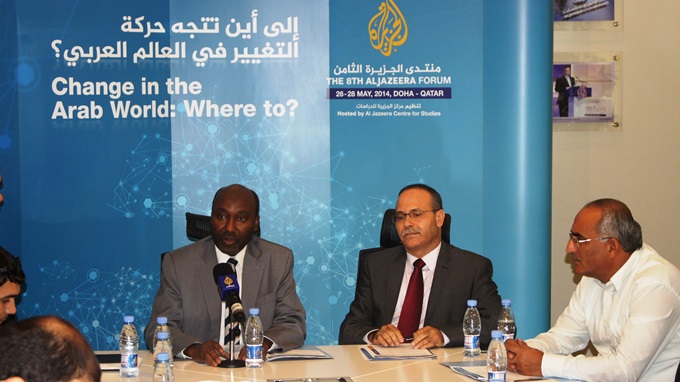
(From left to right) Dr. Salah Eddin Elzein, Director of Al Jazeera Centre for Studies and Head of the Oganising Committee for Al Jazeera Forum 2014, speaking at the press conference and Dr. Ezzeddine Abdelmoula, President and Vice President of the Organising Committee.
AlJazeera Centre for Studies (AJCS) held a press conference the morning of 19 May 2014 at its headquarters to announce the 8th AlJazeera Forum’s schedule and reveal the guest list. Dr. Salah Eddin Elzein and Dr. Ezzeddine Abdelmoula, President and Vice President of the Organizing Committee, discussed the forum’s theme, “Change in the Arab World: Where To?” and explained why the topic was chosen. While the Centre for Studies was responsible for the overall organization of the forum, all of AlJazeera’s units will be active participants in the forum, running several of the parallel sessions. This includes AlJazeera Turk, AlJazeera Balkans, AlJazeera Net, AlJazeera Media Training and Development Centre, AlJazeera Arabic and English and Public Liberties and Human Rights. Nearly 400 guests are expected to attend, about half of them from Doha and the remainder from more than 50 countries worldwide. Confirmed guests include political officials, media professionals and lead academics.
Dr. Elzein, AJCS’ Director, said the concept behind the forum reflects the constant state of change in the Arab world over the past three years as well as serves as an extension of AlJazeera’s motto, “The Opinion…and the Other Opinion”. For example, countries like Egypt and Syria continue to be unstable, prompting questions about their future and whether or not change in those countries will continue. Furthermore, there has been regional and international intervention as well as backlash from change movements in the Arab world, making the forum’s environment a unique one for dialogue between youth, academics, media and civil society activists.
Dr. Elzein added that more substantive youth participation will characterise this year’s forum. “The Youth Platform is an effort to further balance participation in the forum, adding to the rich circle of political elites, media and civil society activists who will be in attendance”, he said. Furthermore, there was a cognisant effort to bring in not only figures from the region, but also from other areas of the world which have a stake in or are related to what is happening in the Arab world. Such figures will insert new factors into the dialogue as well as prompt reflection on outside perceptions of what is happening in the Arab world.
Dr. Abdelmoula, AJCS’ Research Department Manager, detailed the programme for this year’s forum, explaining that morning sessions will be dedicated to keynotes and panel discussions, while the afternoon sessions will be more specific in nature. The parallel nature of the afternoon sessions will give guests more participation opportunities as well as generate dialogue on topics impacting the Arab world and change movements, a key goal of the forum. In addition, even the lunch and dinner periods will be utilized as opportunities for discussion.
The press conference ended with questions about the forum’s content, particularly why political, social and media factors played a more prominent role in the forum’s session themes than economic factors. Dr. Abdelmoula said economic factors will be discussed in several of the sessions, including a seminar coordinated by AlJazeera Balkans titled, “Redefining Relations between the Balkans and the Middle East: Untapped Potential for Economic Cooperation”.

